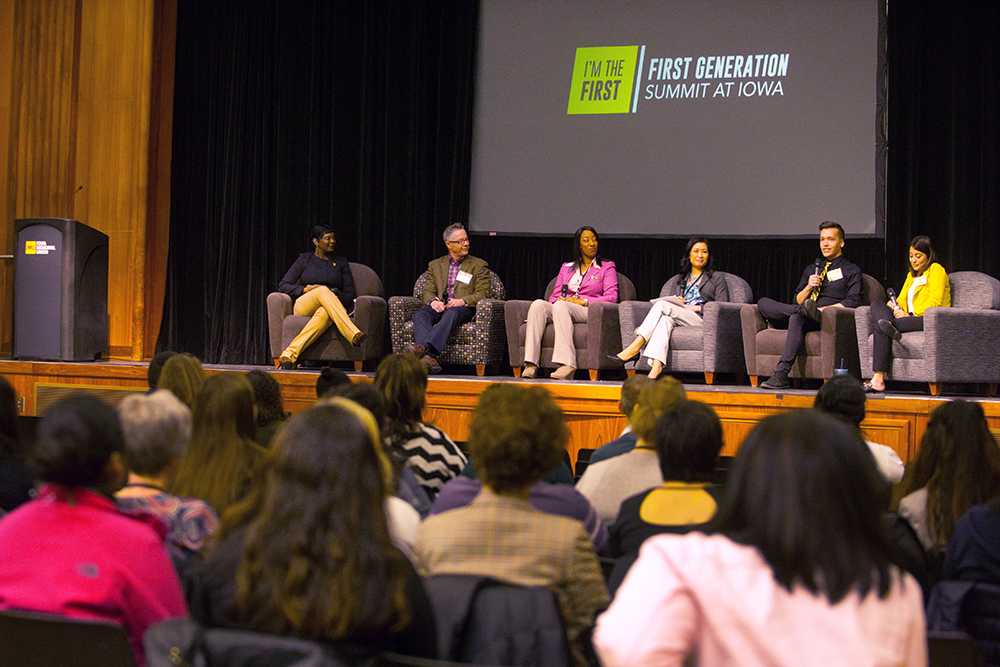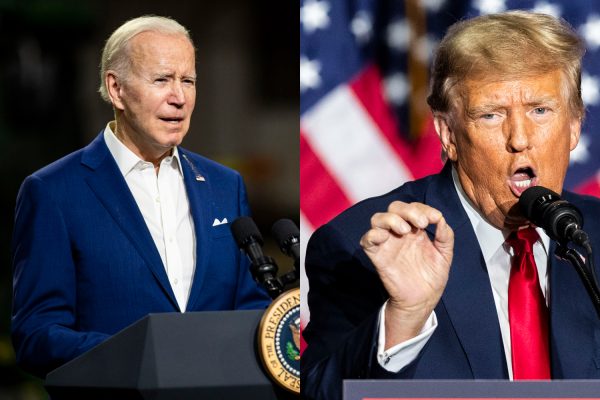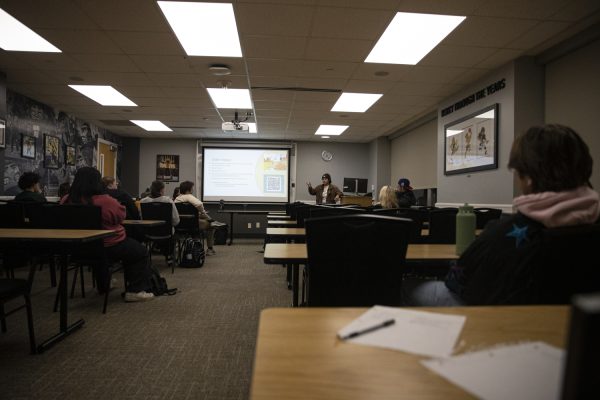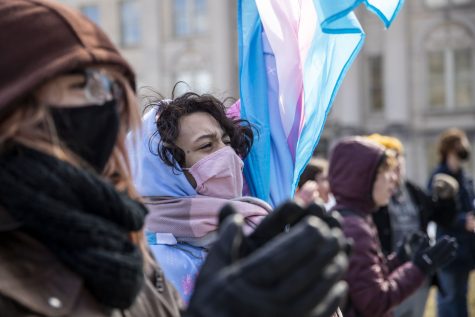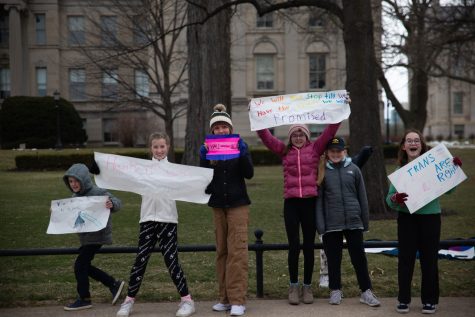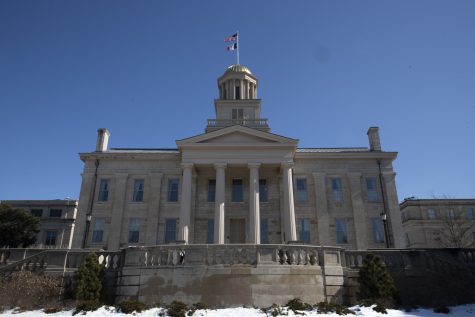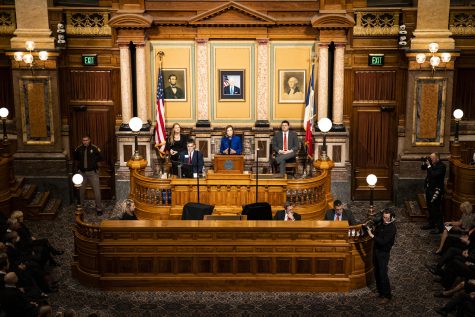Editorial: First Generation Summit veto reflects poorly on UISG
The Daily Iowan Editorial Board urges UISG to build consensus to fund the First Generation Summit, an initiative that is key to institutionalizing support at the UI for this underrepresented student population.
VP for Student Life Melissa Shivers addresses panelists on their struggles as first-generation students during the First Generation Summit in the Iowa Memorial Union on Apr. 7, 2018.
February 21, 2019
University of Iowa Student Government President Hira Mustafa recently vetoed the allocation of funds set to finance the second First Generation Summit. Three days later, despite arguments from the community and the First-Gen Summit Committee itself, UISG upheld the veto with 29 senators in favor of passing the legislation. The Senate had passed the legislation 38-7 with two abstentions just a week earlier.
On April 7, 2018, the First Generation Summit included conversations regarding first-generation students and highlighting the experiences that make their college journeys unique. It prompted an important wave of attention to first-generation students. Following the summit, the UI participated for the first time in the weeklong National First Generation College Celebration in November.
The Daily Iowan Editorial Board urges UISG members to re-evaluate their future plans for the event. The UI has reported that nearly one-fourth of its undergraduates are first-generation students. Vetoing this legislation sets back efforts to institutionalize support on campus for those students.
RELATED: UISG upholds veto on First-Generation Summit funding following budget concerns
First-generation students are a deeply underrepresented group on campus, because the status puts students who are often part of minority groups or socioeconomically disadvantaged at a disadvantage. The choice to veto the First-Generation Summit only reflects poorly on a UISG that has the potential to institute an important, lasting effect and tradition on the campus.
Mustafa’s choice to veto the summit was “on the grounds of unjustified spending when more affordable, practical alternatives are built into our institution,” according to her statement. Yet the money that was supposed to be allocated toward the event was part of UISG’s contingency fund. The fund, composed of the Student Activity Fee, currently sits around $300,000 — and by the end of the term in less than two months, it must be spent down to between $60,000 and $120,000.
The choice to veto the First-Generation Summit only reflects poorly on a UISG that has the potential to institute an important, lasting effect and tradition on the campus.
RELATED: First-Generation Summit Committee responds to UISG president’s veto
According to UISG’s Strategic Allocation Plan, the organization has spent roughly $73,100 this year from this plan on a number of initiatives, including events such as the What About Me(n) Summit, set for Feb. 28, and the Afro House’s 50th anniversary celebration held in October 2018. The plan is an unofficial document that serves as a guide for how the organization allocates “old money” the group has from the last fiscal year in its contingency fund.
Mustafa’s veto seems incongruous with her and the Surge Party’s policies, which aim to “[develop] relationships, [listen and respond] to student concerns … and [create] opportunities to contribute to the Hawkeye community,” according to the UISG website.
RELATED: UI Student Government senators could override president’s vetoes
UISG’s financial situation is a mystery to most students. There are currently no financial records published on the website, and the absence of information is troubling, especially in light of past years in which the governments have published their records. The UISG Constitution states “all organized bodies of UISG shall follow the regulations and rules of the Iowa Open Meetings Open Records Act, as prescribed by Iowa Code, Chapter 22. All UISG records shall be accessible to all students.” UISG is not acting in accordance with its own governing document, though it is worth noting the organization’s website says, “We are having technical difficulties with uploading our agendas, meeting minutes, and pieces of legislation.”
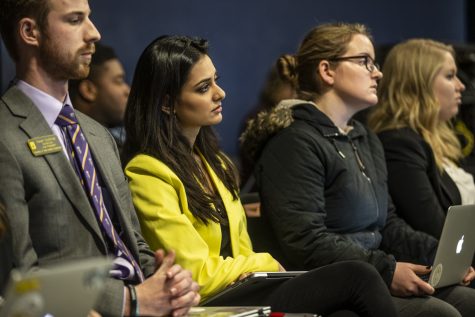
UISG Hira Mustafa looks on during discussion of a potential senate override to her veto on funding for the First Generation Summit at the Iowa Memorial Union on Tuesday, February 19, 2019.
To get anything from UISG, the DI had to email the group directly to request access to fiscal 2019 Student Activity Fee Allocations. It is noteworthy that UISG promptly provided all pertinent information, as well as explanations of each report or record, and volunteered to provide any other necessary documentation. However, having to explicitly ask for the information should not be necessary.
RELATED: UISG president vetoes First-Generation Summit legislation
It is made even more troubling when the president makes vetoes on the basis of a financial cause to which the student population has no access. The addressed issue with this summit is the cost — passed in the Student Senate with a maximum of $25,700 — but the committee members have been quick to say they want to work with Mustafa to “provide additional context surrounding the decisions made when carefully budgeting out the line items for costs.”
One of the most interesting choices to defend was the decision to budget $1,000 toward external photographers. The importance of appropriately paying for skilled labor, especially on a platform that explicitly claims to value the importance of student artwork and “collaborating with on-campus partners,” is another thing that feels like it should be intrinsic to Mustafa’s UISG but apparently is not.
The First-Generation Summit Committee noted in its response to Mustafa’s legislation that UISG is not designated as a nonprofit, meaning “it is more difficult to secure funds via grants, sponsorships, and similar sources of alternative funding.” Importantly, the committee notes it successfully found support for the initiative on campus with the Vice President for Student Life’s Office and the President’s Office as partners committed to institutionalizing support for first-generation Hawkeyes.
UISG has an opportunity to be a leader among higher-education institutions in Iowa and around the U.S. for its support of first-generation students. The DI Editorial Board hopes to see UISG work to build consensus among its ranks to allocate student dollars to the First Generation Summit, an initiative that benefits an underrepresented student population.
Editor’s note: UISG posted financial reports on its website by the morning of Feb. 22 following publication



